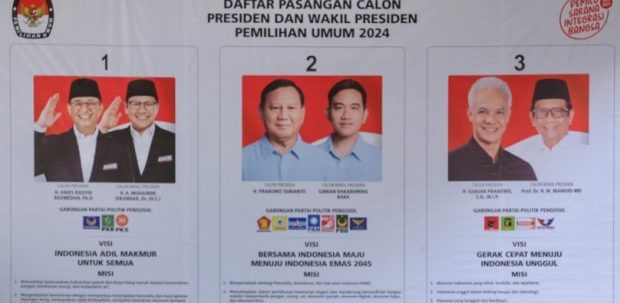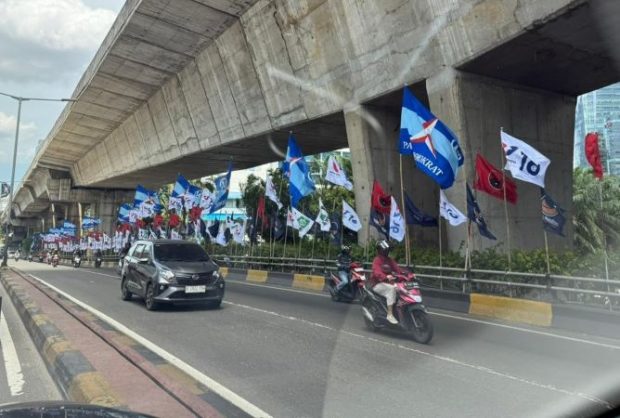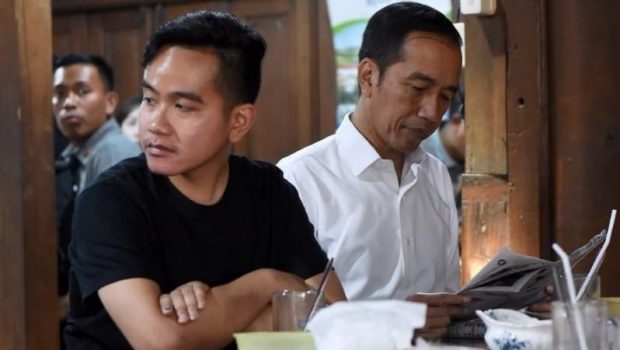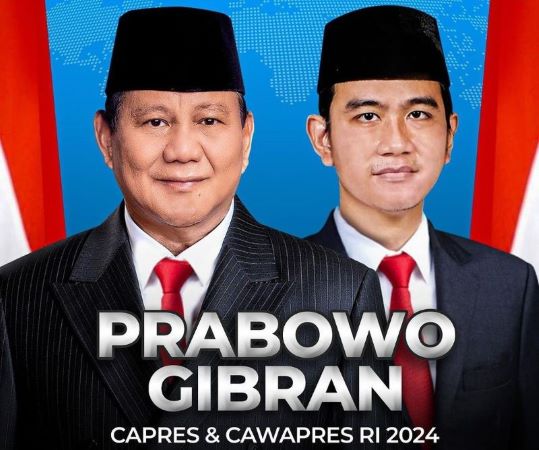
Post Jokowi’s leadership succession

By Eddy Suprapto
AsiaN Reporter
JAKARTA: Immortality is just a fantasy. It turns out that the only thing that remains is opinion. Through the changing seasons, time changes. Power also has limits. In October 2024, President Jokowi’s leadership will end after ruling two general elections and cannot be re-elected.
The Indonesian government will also hold national general elections on February 14, 2024. Not only will the presidential and vice-presidential candidates be selected, but the people will also elect members of the people’s representative councils at the provincial and central levels. In short, 2024 for the Indonesian people is a general election year.
Currently, all cities in Indonesia are covered with banners and billboards with photos of presidential candidates and candidates for members of the People’s Representative Council. Every corner of the city is filled with flags of parties participating in the general election. The cityscape only contains banners and invitations to elect people’s representatives and presidential candidates.
General elections are part of the world of politics whose aim is to elect a leader. Apart from that, general elections are also a form of democracy. These general election activities involve the wider community to voice, convey and make decisions.
Another indication that the general election has arrived is marked by many politicians starting to distribute basic commodities such as rice, cooking oil, meat, fish, sugar, tea, coffee and money to the lower classes.
The government under the leadership of President Jokowi must prepare a path for national leadership succession through general election contestation. The problem arose because the President’s eldest son was participating in the general election contest to become vice presidential candidate paired with Prabowo Subiyanto, a former military man and businessman. Accusations ranging from political dynasties and the smell of fraud were directed at President Jokowi.

Looking Back
In fact, if you look back at Jokowi’s political career track record, it is marked by brilliant achievements. He started his political career as twice elected mayor of Solo, continued to serve as Governor of the Special Capital Region of Jakarta, then became President of Indonesia. President Joko Widodo is said to be a figure who brings new hope to ordinary people.
Jokowi’s name increasingly attracted public attention after receiving awards for a number of breakthroughs while serving as mayor of Solo. He broke the myth of relocation of street vendors which led to violence between authorities and traders. Jokowi was able to move the 900 small traders who filled the city sidewalks in a persuasive manner.
In 2012, Jokowi was selected as the third best mayor in the world according to the World Mayor Project. Jokowi is said to have succeeded in changing Solo from a city rife with crime into a center for arts and culture, which can attract foreign tourists.
While serving as mayor of Solo, Jokowi also initiated what was called Surakarta Community Health Care (PKMS), a free health insurance program for the poor.
When the program was launched in early 2008, public enthusiasm was very high, resulting in long queues forming. said Siti Wahyuningsing, Head of the Solo Health Service recalling the incident at that time.
This health program for the poor became the forerunner of the health insurance program when Jokowi ran as governor of DKI Jakarta and president. After becoming Governor of DKI Jakarta, Jokowi issued the Healthy Jakarta Card which was an improvement on the PKMS. Then care about this health insurance, finally JKN (National Health Insurance). Now National Insurance is managed through the Social Security Administering Body.

In his political career, Jokowi, who became a “media darling,” is said to have succeeded in reforming the bureaucracy, taking shares in PT Palyja from a foreign company, revamping the Tanah Abang Market, relocating residents and repairing the Pluit Reservoir, as well as building rows of village houses for the people. His face was also on the front cover of the leading US magazine, Time, with the main title ‘A New Hope’ or a new hope.
A number of foreign media nicknamed Jokowi as Obama from Jakarta, Mr. Fix – the leader who can fix everything, and The man in the Madras Shirt (the man in the checked shirt).
However, at the end of Jokowi’s reign as president, many groups – including his supporters – accused the furniture entrepreneur of consolidating the “oligarchy” and of wanting to perpetuate power by planning for his eldest son, Gibran Rakabuming Raka, to advance to the 2024 presidential election.
Contestants’ Map
The contest for the election of presidential and vice-presidential candidates in 2024 will be among three pairs and supported by a coalition of parties with colored political orientations.
The first pair is Anies Baswedan, former governor of Jakarta and Muhaimin Iskandar, chairman of the national awakening party. Candidate number 1 is supported by a religiously oriented party base, namely the Prosperous Justice Party, the National Awakening Party, the Ummah Party and a National Democratic Party.
Meanwhile, number 2 presidential candidate Prabowo Subiyanto, as a young man, had a military career and then became a businessman, paired with vice presidential candidate Gibran Raka Bhumi Raka, President Jokowi’s eldest son who has a profession as mayor of Solo. President Jokowi’s son also has a businessman background. Contestation number 2 is supported by a coalition of nationally oriented parties.
Meanwhile, contestant number 3 is the Governor of Central Java, Ganjar Pronowo, who is paired with the vice-presidential candidate, namely the Coordinating Minister for Political, Legal and Security Affairs Mahfud MD. Contestation number 3 is supported by the winning candidate for the 2019 general election who is oriented towards national understanding.
With the composition of three candidates supported by various parties with a mixed national and Islamic voter base, there will be no ideological and voter fragmentation. In contrast, when the 2014-2019 general elections faced off between national parties and religious-based parties, there was very strong fragmentation.
In the final debate, contestants numbers 1 and 3 wanted to merge into a coalition to face candidate number 2, who was joined by President Jokowi’s eldest son. However, if religious and national voters form a coalition, its effectiveness is still questionable. The general public has concluded that there is no longer an ideological problem but only power.
In fact, what is happening is a struggle for power through general election competition. Joseph Schumpeter stated “When politics teaches that the job of politicians is actually to carry out the will of the people, what actually happens is that they only care about themselves.”

Election Dynamics
The participation of the President’s eldest son in the contest for presidential and vice-presidential positions has become a target for his political opponents. It is not surprising that the campaigns of the two other political competitors are carrying out dynastic political campaigns. Political competitors accused President Jokowi of practicing dynastic politics in the 2024 general election.
This accusation was expectedly rejected by President Jokowi. “Yes, that’s the public’s judgment,” said President Jokowi. The level of public satisfaction with President Jokowi’s performance so far is still above 73% even though he only has 1 month left in office.
The two dramas of President Jokowi’s relationship with his supporting party, namely the Indonesian Democratic Party of Struggle, were tense because the party supported another candidate, not Jokowi’s son. In his statement, Secretary General of the Indonesian Democratic Party of Struggle, Hasto Kristiyanto, admitted that “we were abandoned by Jokowi after the Party “gave President Jokowi and his family such great privileges.”
Meanwhile, according to the Pro Jokowi Volunteers’ presidential election winning body, the Barus Panel, it is considered normal in the presidential competition that there are differences. “I believe and believe in Jokowi until this moment. “That Pak Jokowi is with us, still on the same track, bringing Indonesia forward,” he said. Accusations of dynastic politics against Jokowi and his family are commonplace in the run-up to elections, the Panel said.
In the previous two elections, Jokowi was also accused of being a communist member, having a fake diploma and being a foreign agent. “Now it’s like that again. “These accusations have emerged,” said the Panel, claiming that there are 5 million Pro Jokowi sympathizers and cadres who are loyal to Jokowi. This movement supports Prabowo-Gibran in the 2024 presidential election, even though it was internal. Ultimately, the goal of elections. Are we participating in the politics of cynicism or hope?
Leadership transition
Coinciding with Valentine’s Day, February 14 2024, will determine Indonesia’s new leadership. Even though tensions are currently hot, the government is confident that the election will run safely. Jokowi’s excellence, one of which was realized by preparing a leadership transition, even though he himself was perceived as the antithesis of all the bad things in the New Order government, including political dynasties. In fact, what Jokowi is doing is just following, continuing, a tradition that has been going on for a long time, since the reform era.
Entering his second year of government, Jokowi as a political person began to metamorphose. Especially in preparing for Indonesia’s leadership transition. Not only is the power to embrace opposing political elite groups, but the volunteer base continues to be developed.
Because each of Jokowi’s political experiments had an electoral effect on the political parties, his supporting coalition in 2014 won 63% of parliamentary seats. In the second period Jokowi also won, gaining up to 60% of the seats. Jokowi’s characteristic is in managing the government using a coalition even with his political opponents.
From the start, President Jokowi wanted a model of political harmony. During its journey, Jokowi’s government coalition dominated up to 80% of the votes in parliament. As a businessman, Jokowi wants democracy to be more adaptive to developments, strengthening unity and minimizing differences.
The President said, “So I need to convey that our democracy is a mutual cooperation democracy,” said Jokowi at the Presidential Palace on October 24 2019. The concept of cooperation democracy is in line with Prabowo Subiyanto’s leadership pattern. It is not surprising that Jokowi and Prabowo have similar views in implementing the leadership of the new government, especially in the 2024 general elections.
President Jokowi wants to see Indonesia’s future leadership transition held by someone who is always able to solve the nation’s problems. And prioritize national interests above groups and even parties. Despite criticism ahead of his retirement, Jokowi has at least become the first president in the reform era to admit on behalf of the state to gross human rights violations in the past – even though in the process he was challenged to bring the perpetrators to justice.
Welcoming the 2024 presidential election, a Russian figure commented, “Politicians are all the same. They promise to build bridges, even though there are no rivers.”


